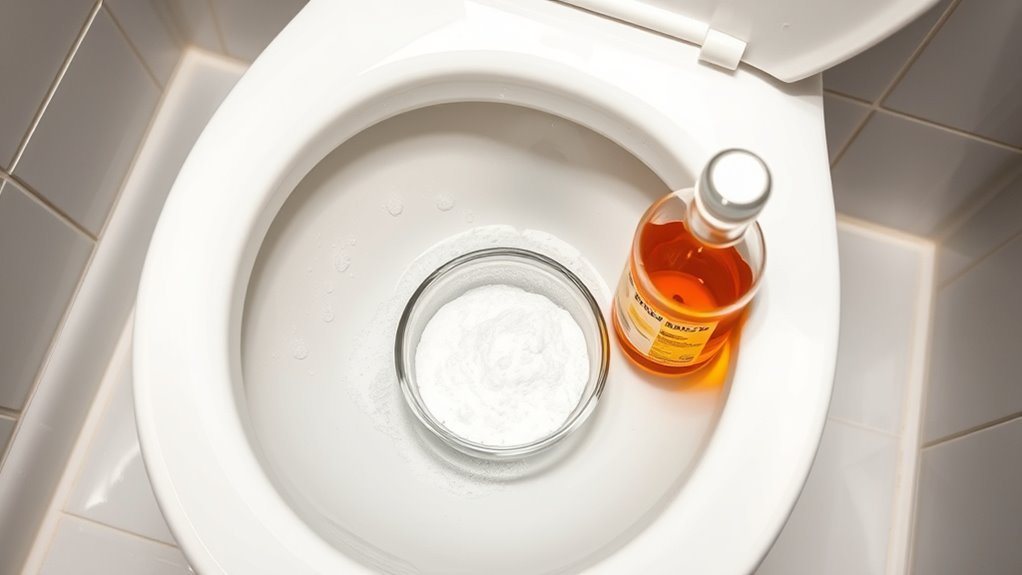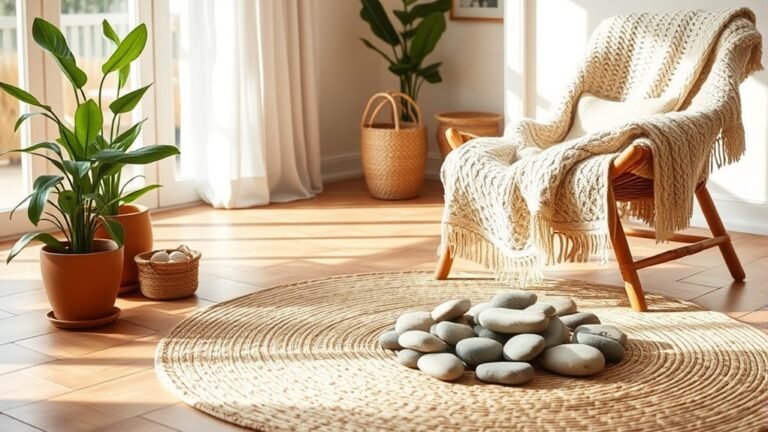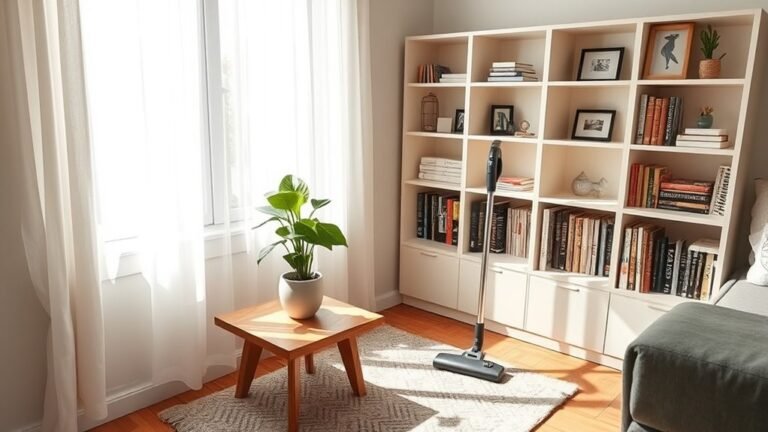How to Remove Stubborn Stains From Toilet
To remove stubborn toilet stains, start by identifying the type—rust, hard water, or mineral buildup—then use natural remedies like baking soda with vinegar for minerals or a lemon juice and borax paste for rust. Scrub tough spots with a pumice stone and wear gloves for protection. Regular cleaning prevents buildup, while commercial cleaners can help for persistent stains. Keep your toilet fresh and stain-free, and you’ll find simple tips that make maintaining cleanliness easier than you think.
Identifying Different Types of Toilet Stains

Before you tackle toilet stains, it’s important to know what you’re dealing with. Toilet stain types vary, including hard water rings, rust, and mineral buildup. Each requires a different approach, so recognizing them is key to effective stain removal techniques. Hard water stains often appear as white or grayish deposits, while rust stains show up as orange or reddish marks. Mineral buildup can cause rough patches or discoloration inside the bowl. Once you identify the stain type, you can choose the right method to break free from stubborn marks. Understanding these distinctions gives you the power to restore your toilet’s cleanliness without wasting time or energy on ineffective solutions. Freedom starts with knowing exactly what your toilet needs.
Essential Tools and Cleaning Supplies Needed
To tackle stubborn toilet stains effectively, you’ll need the right tools and cleaning supplies at hand. Essential items include a sturdy toilet brush, rubber gloves, and a pumice stone for tough spots. You’ll also want powerful cleaners like bleach, vinegar, or specialized stain removers to get the job done.
Must-Have Cleaning Tools
A few key tools can make tackling stubborn toilet stains much easier and more effective. First, you’ll want reliable cleaning brushes that reach every nook and cranny—especially under the rim where grime loves to hide. Toilet scrubbers with sturdy bristles are essential, giving you the power to break down tough buildup without damaging the porcelain. A long-handled brush keeps your hands free from mess, so you stay comfortable and focused. Don’t forget a handy scraper or pumice stone for the most stubborn spots, but always use them gently. Having these must-have cleaning tools on hand means you’re ready to fight stains swiftly and confidently, keeping your toilet fresh and your cleaning routine hassle-free.
Effective Stain Removal Supplies
Getting the right cleaning supplies can make stubborn toilet stains disappear faster and with less effort. You’ll want a sturdy toilet brush, but don’t overlook eco friendly alternatives like biodegradable scrubbers that protect both your bathroom and the planet. For tough stains, grab a pumice stone or a natural cleaner containing vinegar or baking soda. These options tackle grime without harsh chemicals, giving you freedom from toxins. Don’t forget gloves to keep your hands safe and a spray bottle for easy application. To keep stains at bay, consider a weekly application of an eco friendly stain prevention solution—this saves you time and effort in the long run. With these supplies, you’re all set to restore your toilet’s shine and maintain it sustainably.
Using Baking Soda and Vinegar for Mineral Deposits

You’ll often find that baking soda and vinegar make a powerful duo for tackling mineral deposits in your toilet. The vinegar reaction with baking soda creates fizzing bubbles that help loosen tough buildup, freeing you from scrubbing endlessly. Here’s how you can use these common items:
- Sprinkle about a cup of baking soda directly onto the mineral deposits.
- Pour a cup of vinegar over the baking soda and watch the fizzing action work its magic.
- Let the mixture sit for 10-15 minutes, then scrub with a toilet brush and flush.
This simple method gives you control, using natural ingredients to break down mineral stains without harsh chemicals. It’s an easy way to reclaim your toilet’s cleanliness and your freedom from stubborn stains.
Removing Rust Stains With Lemon Juice and Borax
If you’re struggling with rust stains, lemon juice is a natural acid that helps break them down effectively. Mixing it with borax creates a powerful paste that sticks to stains and boosts cleaning power. You’ll want to apply the paste directly, let it sit, then scrub for best results.
Benefits of Lemon Juice
Lemon juice offers several powerful benefits when it comes to removing rust stains from your toilet. Its natural disinfectant properties mean you’re not just cleaning, but also killing bacteria without harsh chemicals. Here’s why lemon juice benefits your cleaning routine:
- Effective Rust Removal: The citric acid breaks down rust, making stains disappear with minimal scrubbing.
- Eco-Friendly and Safe: You get a non-toxic solution that’s safe for your family and the environment.
- Fresh Scent: Unlike chemical cleaners, lemon juice leaves a revitalizing, natural aroma, freeing you from unpleasant smells.
Borax Application Tips
Combining borax with lemon juice creates a powerful duo for tackling stubborn rust stains in your toilet. To get the best results, sprinkle borax directly onto the stain, then apply fresh lemon juice on top. Let this mixture sit for 15 to 20 minutes to allow the natural acidity and borax properties—like its gentle abrasiveness and stain-lifting power—to break down the rust. Afterward, scrub with a toilet brush and flush. If you’re looking for borax alternatives, baking soda or cream of tartar can work, though they may require longer contact time or repeated applications. Remember, using these natural solutions frees you from harsh chemicals while effectively restoring your toilet’s shine. Keep your cleaning routine simple, safe, and effective.
Combining Lemon and Borax
When you’re dealing with tough rust stains, mixing borax with fresh lemon juice can be a game-changer. The lemon benefits include natural acidity that breaks down rust, while borax properties boost scrubbing power and lift stains effectively. Here’s how you can combine them:
- Squeeze fresh lemon juice into a bowl and add 2 tablespoons of borax, creating a paste.
- Apply the paste directly onto rust stains and let it sit for 15–20 minutes.
- Scrub with a toilet brush or sponge, then flush to rinse away residue.
This combo lets you reclaim your toilet’s shine without harsh chemicals, giving you freedom from stubborn marks with a natural, powerful duo.
Tackling Hard Water Stains With Pumice Stone
Although hard water stains can be tough to remove, using a pumice stone can make the process much easier. One of the pumice stone benefits is its gentle abrasiveness, which scrubs away mineral deposits without damaging your toilet’s surface. To get the best results, soak the pumice stone and the stained area in water first — this softens the stone and prevents scratching. Use effective scrubbing techniques by applying light pressure and working in circular motions, focusing on stubborn spots. Rinse the area frequently to check your progress. With this approach, you can tackle those persistent hard water stains yourself, freeing you from relying on harsh chemicals or costly cleaners. Just remember to keep the stone wet, and you’ll restore your toilet’s shine in no time.
Applying Commercial Toilet Bowl Cleaners Safely

While pumice stones work well for mineral buildup, some stains might call for commercial cleaners to get the job done. When using these powerful products, you need to follow safety precautions to protect yourself and your space. Here’s how to apply commercial toilet bowl cleaners safely:
- Read and follow all product instructions carefully to avoid damage or injury.
- Wear gloves and guarantee good ventilation by opening windows or turning on a fan.
- Avoid mixing cleaners, especially bleach with acids, to prevent harmful fumes.
Preventing Future Stains and Maintaining Cleanliness
Because stubborn stains can be tough to remove, you’ll want to take steps that keep your toilet clean and prevent buildup in the first place. Preventive maintenance through regular cleaning is your best defense. Wiping down the bowl weekly and flushing regularly keeps stains from settling in, giving you freedom from harsh scrubbing later.
Here’s a simple routine to keep your toilet spotless:
| Task | Frequency |
|---|---|
| Quick wipe-down | Every 2 days |
| Deep clean | Weekly |
| Inspect for stains | Monthly |
Stick to this schedule, and you’ll enjoy a cleaner bathroom with minimal effort. Maintaining cleanliness isn’t just about looks—it’s about creating a space that feels fresh and free. Your commitment to preventive maintenance pays off, saving you time and frustration in the long run.
Natural Remedies for Eco-Friendly Cleaning
If you’re looking to keep your toilet clean without harsh chemicals, natural remedies offer a safe and effective alternative. These eco friendly alternatives not only protect your health but also reduce your environmental impact. You can easily whip up homemade solutions that work wonders:
- Baking soda and vinegar: Sprinkle baking soda inside the bowl, then pour vinegar. Let it fizz and sit for 15 minutes before scrubbing.
- Lemon juice: Its natural acidity breaks down stains and leaves a fresh scent. Apply directly, let sit, then scrub.
- Borax: Mix with water to create a paste for tough stains; let it sit overnight, then brush clean.
When to Call a Professional for Stubborn Stains
Natural remedies can tackle many toilet stains, but some marks might not budge no matter how much you scrub. That’s when to seek help from a professional who can handle tough stains safely and effectively. Knowing the signs of urgency can save you time and protect your plumbing.
| Signs of Urgency | When to Seek Help | Why It Matters |
|---|---|---|
| Persistent dark stains | If stains remain after repeated cleanings | Prevents damage to porcelain |
| Foul odors | When odors linger despite cleaning | Indicates deeper issues |
| Mineral buildup | If lime scale resists natural cleaners | Protects toilet function |
| Cracks or chips | Visible damage alongside stains | Avoids costly repairs later |
If you notice these signs, calling a professional is your best move for lasting freedom from stubborn toilet stains.
Frequently Asked Questions
Can Toilet Stains Cause Health Issues if Left Untreated?
If you leave toilet stains untreated, they can harbor toilet bacteria that might pose health risks over time. While not all stains are dangerous, the buildup can create a breeding ground for germs, increasing your chance of infections or allergies. You don’t want to be stuck with preventable problems, so keeping your toilet clean helps you maintain your freedom from health worries and enjoy a safer, more hygienic space.
How Often Should I Deep Clean My Toilet to Avoid Stains?
Clean daily, scrub weekly, deep clean monthly—that’s your ideal toilet cleaning frequency. To keep stains at bay, you’ll want to stick to this routine and embrace stain prevention tips like using a toilet brush regularly and applying a descaling cleaner once a week. By staying consistent, you’ll enjoy a fresh, stain-free toilet without feeling chained to endless chores. You deserve a clean bathroom that feels effortless and freeing.
Are There Any Toilet Seat Materials That Resist Staining Better?
If you’re looking to avoid stubborn stains, plastic seats are a great choice since they’re less porous and easier to clean. You might also consider toilet seats with ceramic coatings, which provide a smooth, non-stick surface that resists stains and grime. These materials let you enjoy more freedom from constant scrubbing, so you can spend less time worrying about stains and more time living your life hassle-free.
Can Hard Water Stains Damage Toilet Plumbing Over Time?
Hard water stains can build up like mountains inside your plumbing, making things tougher than you’d think. While hard water itself won’t wreck your pipes overnight, over time, the mineral deposits can clog and corrode your toilet’s plumbing, leading to costly repairs. If you want to keep your freedom from plumbing headaches, regular plumbing maintenance is key. Addressing hard water stains early helps you avoid damage and stay in control of your home.
Is It Safe to Mix Commercial Cleaners With Natural Remedies?
You shouldn’t mix commercial cleaners with natural remedies without checking cleaner compatibility first. Combining chemicals can be dangerous and might reduce stain removal effectiveness or release harmful fumes. If you want to keep things safe and effective, use one type at a time and follow label instructions. That way, you maintain freedom in your cleaning choices without risking damage or health issues. Always prioritize safety while going after those tough stains.






